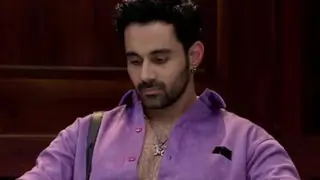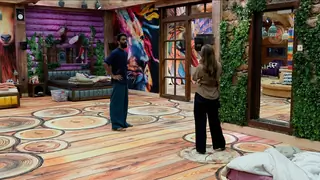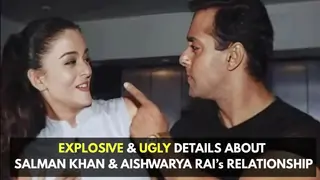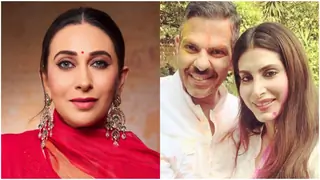| Celebrating the girl child: Laadli on Star Plus |
Television serials take up social themes with a vengeance
By Nikita Doval
The first time the impact of a television soap made it to the front pages of the national dailies was when Ekta Kapoor bumped off a much loved character in that weepy epic Kyunki Saas Bhi Kabhi Bahu Thi and threw the nation in a tizzy. But it would be almost a decade since the feat could be repeated and this time around, the honour was wrested by Balika Vadhu. The serial revolves around child marriages in Rajasthan and the life of a child, Anandi. Encouraged by the show, Rekha, a 12-year-old bidi worker's daughter in West Bengal, refused to become a child bride.
The wheel had turned full circle for Indian television a few months before Rekha's bold act, what with saas bahu sagas going off air and Balika Vadhu, on Colors, became a roaring success. Balika Vadhu propelled a one-year channel to the top of the game and also ushered in a whole new trend, that of 'social themes'-now the mainstay of prime time on the entertainment channels.
On Zee TV there is Agle Janam Mohe Bitiya Hi Kijo, which deals with a labourer family in Bihar, which was forced to sell their daughter. While Star Plus has Laadli, a saccharine sweet story about a baby girl born into a family of boys with a subplot on adoption. There was also Kiran Bedi's Aap Ki Kachcheri which enjoyed a decent run and is now looking at a second season. NDTV Imagine has Bandini, in which a young girl is married off to a man much older than her, while Colors, the leader of the pack, apart from Balika Vadhu has Uttaran, a series which examines the world of the haves and have-nots through the eyes of a small child, and Na Aana Is Des Lado, which deals with the issue of female foeticide.
So what brought about this change? Was it simply saas bahu fatigue or the wish for soaps which are a little more rooted in reality? It is a combination of these two-the saas bahu cycle was over and the never-ending sagas of evil mother and sisters-in-law, adultery, return from the dead-and the audience was craving for something new. "People don't want to see the lives of rich people, embroiled in impossible problems any more. Now they want stories about real people and problems that exist," says Akash Chawla of Zee TV. He says, "The emotional content, the drama, is all there and the viewer knows that these are stories found everywhere, so why should they discriminate on the basis of social and economic standing?"
But Chawla refutes the argument that social themes came into vogue only after Balika Vadhu saying that the channel had launched Saat Phere, which examined the plight of a dark-skinned girl more than three years ago. "We are not following any trend, we have always examined issues which are prevalent in society," he says.
The idea of Balika Vadhu was "with us" for at least a couple of years, confirms producer Sunjoy Wadhwa, "but each story has to be told at the right time". Why the channels were not interested in the show when K sagas ruled the roost is anyone's guess. But today 'change is welcome'. "Everyone knows about child marriages, but what does it entail? People are aware about the issue, but not the finer details," says Ashvini Yardi, the programming head of Colors.
Real and believable are suddenly the two buzzwords around which the industry is converging, so stories are being set in places like Agra and characters are drawing their quirks from real people. "Our show Laadli deals with issues like the girl child and adoption but in a very honest manner. There is no forced negativity and that is what people want these days," says Anupama Mandloi, senior creative director, Star Plus. The idea, according to Anjana Sood, the writer of the show, was to celebrate the girl child and not highlight her suffering.
It also helps that the shows are not really taking either the audience or their intelligence for granted by exposing them to "flights of fantasy" as Wadhwa puts it. "There are no people returning from the dead, no former girlfriends turning up but the show follows a logical track with real turns," says Rajesh Ram Singh, director of Agle Janam. "Tales of independent, city-based protagonists or call centre employees would not have worked because there is still a disconnect between the urban and the rural India. And in television, the tastes are dictated by the masses, not classes," says a writer with a popular show. And with shows involving child protagonists, it is the innocence that people are reacting to. That also explains why Zee is launching a new show with a young girl named Antara as the protagonist.
But for how long will all these shows, with their 'different' storylines, be able to sustain the pace? Sooner or later, every well-intentioned show, be it Saat Phere or even Bidaai which explored the world's attitude to two sisters, one fair and the other dark, finally succumbed to the trap of scheming in-laws and double-triple identities. "Saat Phere is going off air," informs Chawla, admitting that the show did go a little off-track, but at the same time reaffirming the channel's commitment to Agle... storyline. "We have a set storyline, there are going to be no changes," adds the director. While Yardi says, "We are dealing with issues which have not even been touched upon on television like puberty." Sood insists that her show will follow the original storyline of the protagonist being the 'laadli' no matter where she is.
There is also the issue of treading the fine line between dramatic content and sensitivity. "We try not to preach, it is important that the point is driven home, but without resorting to any sensational tactics," says Sood. In Balika's case, the show ends with a strong message against child marriages. "The issues can be highlighted in an entertaining way," says Yardi. Reportedly, once the ratings of the show started going up, Colors decided to speed up the screenplay. In the original version Anandi was supposed to get married only after quite a few episodes.
Can one really expect people to develop a higher social consciousness based on the shows on prime time? According to sociologist Shiv Visvanathan, "These shows definitely make people more aware, they are playing out the contradictions in modern India and actually managing to convert some." Today, TV is no longer an escape medium; it is now "part of our environment and people want it to reflect reality."
Even as channels rush to jump on the social theme bandwagon, some like Sony Entertainment Channel prefer to play it differently. They have been advertising a change from the end of this month that will look at "contemporary" theme. However, the audience is looking for the story of the underdog, the one they can root for and whose story makes them believe that there is perhaps hope for all, out there.


























